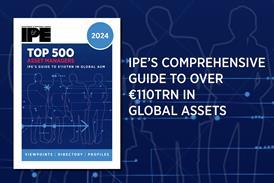More comment – Page 6
-
 Opinion Pieces
Opinion PiecesUS pension funds hone in on private credit
Private credit has been one of the fastest growing asset classes in the institutional world over the past several years, according to Catherine Beard, senior vice-president in consultancy Callan’s alternatives group.
-
 Opinion Pieces
Opinion PiecesAustralian super funds expand their global footprint
With billions of dollars flowing into its treasury each year, Australia’s largest industry super fund, AustralianSuper, is finding that it is rapidly outgrowing its own backyard.
-
 Opinion Pieces
Opinion PiecesInvestors do not care about physical climate risks
One of the most pressing questions facing today’s climate research is whether climate change risks are reflected in stock prices. In a peer-reviewed study* recently accepted for publication in Journal of Banking and Finance, we found that investors only care about climate change risks when policymakers intervene, not about physical climate risks.
-
 Opinion Pieces
Opinion PiecesPension funds can drive the AI revolution
Time and again we are reminded that the sole focus of pension funds should be on paying pensions. However, as stewards of capital, and because of their irreplaceable social function, they can aspire to be something greater than that. One outcome of pension funds’ decisions that is well within reach is positive technological innovation, including within the field of artificial intelligence (AI).
-
 Opinion Pieces
Opinion PiecesNBIM’s Shanghai exit: more than ‘operational’ adjustment’
When Norway’s sovereign wealth fund announced in September it was shutting down its only office in China, the move was bound to be seen as symbolic of the deteriorating relationship between China and the US and its allies. It also came at a low-point for investment in China, with foreigners having sold off a record CNY90bn (€11.5bn) of Chinese stocks in August, amid fears over China’s tensions with the West, its property crisis and weak post-COVID economic recovery.
-
 Opinion Pieces
Opinion PiecesViewpoint: Macron’s reform paves way for development of French second- and third-pillar pension
The rationale of the reform is simple: the rising life expectancies combined with decreasing birth-rate have accelerated the aging of the French population
-
 Opinion Pieces
Opinion PiecesViewpoint: Let us redefine industrial policy
Peter Kraneveld proposes to think in terms of ‘economic change policy’ instead
-
 Opinion Pieces
Opinion PiecesEurope escaped the Great Retirement Boom but watch out for the crunch
Continental Europe appears to have largely escaped the trend known in the US as the ‘Great Retirement Boom’, where an economically comfortable cohort of 50 to 64-year-olds has retreated from work in the post-COVID period.
-
 Opinion Pieces
Opinion PiecesResistance to Germany’s new buffer fund proposal
Last year, the manager of Germany’s pay-as-you-go first-pillar scheme, Deutsche Rentenversicherung, recorded income of €363bn, the largest share coming from contributions (€275.6bn), and €87.4bn in public subsidies.
-
![RobertGEcclesPhoto[1]](jpg/142823_robertgecclesphoto1_404467_crop.jpg) Opinion Pieces
Opinion PiecesESG remains mired in politics in the US
“I am not going to use the word ESG because it’s been misused by the far left and the far right,” said BlackRock CEO Larry Fink in a conversation at the Aspen Ideas Festival in June.
-
 Opinion Pieces
Opinion PiecesConcerns over plans for Australian super funds to provide advice
In what some see as a controversial move, Australia’s Labor government under prime minister Anthony Albanese has reformed the nation’s financial advice industry, opening the door for industry superannuation funds to offer financial advice to millions of members.
-
 Opinion Pieces
Opinion PiecesHow to improve investment committees
Most asset management firms, private and public institutional investors and family offices have investment committees. Poorly designed boards can potentially destroy substantial value in the investment management industry, yet little research is available. I would like to propose a new way to think about the governance of investment committees.
-
 Opinion Pieces
Opinion PiecesCambridge and Westminster: a tale of two pension schemes
The Houses of Parliament and Cambridge University are two venerable British institutions. But the differences in how they run their pension arrangements illustrate the contrast between the UK-style pooled liability-driven investment (LDI) and a more traditional form of pension investing, no longer as popular in the UK but still common elsewhere.
-
 Opinion Pieces
Opinion PiecesViewpoint: How to prepare your scheme for the buyout backlog
Schemes must proactively prepare for major delays in risk transfers
-
 Opinion Pieces
Opinion PiecesViewpoint: Is long-term benchmarking realistic?
Instead of asking ‘what is a long-term model for investment benchmarks,’ we can ask ‘how many institutions view long-term benchmarking as practical?’
-
 Opinion Pieces
Opinion PiecesViewpoint: It’s the government’s move now
Pension funds should urge governments to support new products and habits to reduce CO2 emissions
-
 Opinion Pieces
Opinion PiecesViewpoint: Climate change action is failing
Recent research showed that around two in three respondents in financial organisations did not believe their own climate promises could be kept in time
-
 Opinion Pieces
Opinion PiecesViewpoint: Breaking the banks
Pension funds should ally themselves with activist investors to break up the hegemony of large banks
-
 Opinion Pieces
Opinion PiecesCapital competition: where does it leave sustainability goals?
For pension funds and other similar large institutional pools of capital, there is significant pressure from politicians to invest in politically favoured domestic sectors – like renewables or high-growth sectors like venture capital.
-
 Opinion Pieces
Opinion PiecesLessons learned from Berlusconi’s pension reforms
To some, the death of Silvio Berlusconi on 12 June this year, is the end of an era for Italian politics. Berlusconi was the longest-serving prime minister in the history of the republic and a highly controversial figure, at home and abroad. He can be described as the first modern European populist leader.





